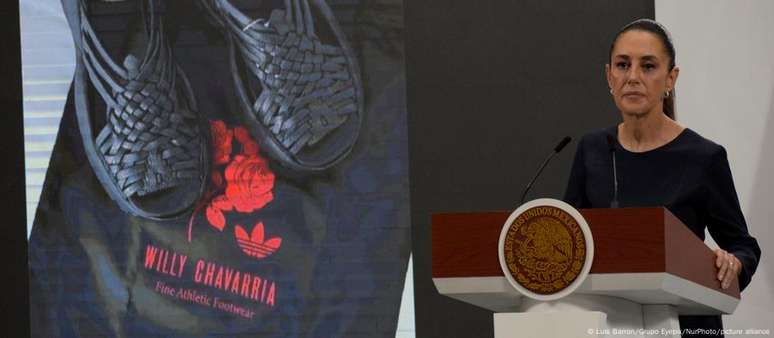The new German sports brand sandals inspired by a model with indigenous roots have caused accusations of “cultural appropriation”. Adidas says he will meet Mexican authorities to “correct damage”. The designer Willy Chavaria complained on Saturday (10/08) the dispute that broke out this week after the launch of one of his creations, a model of sandals in collaboration with Adidas, which caused accusations of “cultural appropriation” by the Mexican authorities.
The model of sandals in Slip-on Chavaria Oaxaca was inspired by a traditional style of Oxaca sandals, known as Huarache and which has indigenous roots.
But, according to the Mexican authorities, the company and the designer have not tried to obtain authorization for the name and have not recognized the original authors. The controversy has even involved the president of Mexico Claudia Sheinbaum, who has accused the main international companies of appropriate creations of the indigenous communities. The authorities also requested the suspension of the sale of the product.
After the controversy extended for several days, Chavaria, an American with Mexican roots, finally brought the dispute closer to Saturday.
“I deeply sorry that this design has appropriate the name and has not been developed in a direct and significant partnership with the Oaxaca community,” said Chavaria in a note.
He said he recognized that the sandals “did not correspond to respect and collaborative approach” deserved by the community of Villa Hidalgo Yalalag, a Mexican village known as the place of origin of the Huaraches sandals.
The German company of sports goods has already declared in a letter published on Friday that “deeply appreciates the cultural richness of the indigenous populations of Mexico and recognizes the relevance” of criticism. The company also claimed to have requested a meeting with the local Mexico authorities to discuss how it can “repair the damage” caused to indigenous populations.
Criticism
The sites specialized in the tennis market and other sports shoes had reported the launch of sandals this week during an Adidas event in Puerto Rico. The model was described as inspired by Huarache sandals and a tribute to the Mexican roots of Chavaria.
However, the images of the footwear quickly caused the reaction of Mexican politicians by the Oxaca region, who asked for the suspension of the sale of the product and accused Chavaria and Adidas of “cultural appropriation”.
“This is not just a design, it is the culture, history and identity of an original people and we will not allow it to be treated as a commodity,” said the governor of Oaxaca Salomón Jara, in a video published on Rede X.
In turn, the secretariat of culture and art of Oaxaca highlighted in a declaration that adoption without consenting cultural elements of the original peoples for commercial purposes is the “violation of their collective rights”.
The Agency also requested the “immediate suspension of marketing” of the new model, the opening of a process of dialogue and repair of diseases of the Yalalag community and the public recognition of the origin of the design.
Later this week, the Mexican president Claudia Sheinbaum entered the controversy, stating: “large companies often take products, ideas and projects of indigenous community; we are analyzing the legal part in order to support them”.
Sensitive theme in Mexico
In recent years, Mexico has denounced the cultural appropriation and unauthorized use of the art of its indigenous peoples by important brands and designers from all over the world.
In 2023, it was the turn of the Chinese society Shein, accused of cultural appropriation of the elements of the culture and identity of the Nahua people, by the state of Puebla. At the time, the Mexican government complained of economic and moral damage to this segment of the population.
“This is a principle of ethical consideration that, local and global level, forces us to attract attention and put into public question a theme that cannot be postponed: to protect the rights of the original populations that have been historically invisible”, said the secretariat of the Culture of the Mexico Government at the moment.
Others accused of plagiarism and cultural appropriation of Mexican peoples in the last six years include the French designer Isabel Marant and luxury brands Zimmermann and Carolina Herrera.
Global discussion
Similar accusations also influenced the image of Prada in July. The Italian brand debuted on the catwalk of the Milan fashion week described as “leather sandals”.
But for the critics of Indian fashion, craftsmen and politicians, it was a copy of the traditional Kolhapuri sandals – which bear the name of the city of Kolapur, in the Maharamtra, in western India, and date back to the twelfth century.
For over 25 years, developing countries and indigenous populations have pushed the laws on intellectual property that protect better, from the exploitation of third parties, flora, fauna, traditional knowledge and local cultural heritage.
More recently, however, the cry has grown, including the United Nations (one), so that companies commit this type of abuse in the fashion sector are responsible.
JPS (OTS, DW)
Source: Terra
Rose James is a Gossipify movie and series reviewer known for her in-depth analysis and unique perspective on the latest releases. With a background in film studies, she provides engaging and informative reviews, and keeps readers up to date with industry trends and emerging talents.


![Such a wonderful sun in advance: August 13, 2025, Summary of Wednesday Episode [SPOILERS] Such a wonderful sun in advance: August 13, 2025, Summary of Wednesday Episode [SPOILERS]](https://fr.web.img3.acsta.net/img/0e/66/0e66cd7c43df61060be104979eb3e539.jpg)





